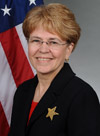

Inducted in 2012
Jane Lubchenco has been the undersecretary of commerce for oceans and atmosphere and administrator of NOAA since 2009.
Nominated by former President Obama in December 2008 as part of his science team, she is a marine ecologist and environmental scientist by training with expertise in oceans, climate change, and interactions between the environment and human well-being.
Under Jane’s leadership, NOAA focused on restoring fisheries to sustainability and profitability, restoring oceans and coasts to a healthy state, ensuring continuity of the nation’s weather and other environmental satellites, and developing a weather-ready nation.
Jane helped in the promotion of climate science and delivering quality climate products; strengthening science and ensuring scientific integrity at NOAA, and delivering the highest quality science, services, and stewardship possible.
Jane served on numerous commissions and studies as president for the American Association for Advancement of Science (AAAS), the International Council for Science, and the Ecological Society of America; and as a member of the National Science Board.
Before coming to NOAA, Jane co-founded three organizations (The Leopold Leadership Program, the Communication Partnership for Science and the Sea, and Climate Central) that aim to communicate scientific knowledge to the public, policy-makers, media, and industry. She co-founded a research consortium, PISCO, which studies the near-shore ocean along the coasts of Oregon and California.
Jane’s Awards and honors include distinguished professor of zoology at Oregon State; a Wayne and Gladys Valley professor of marine biology; and a Haas distinguished visitor in public service at Stanford University.
She has 19 honorary doctorates and received the Prince Albert II of Monaco Foundation Climate Change Award. She was awarded the distinguished public service Award—the highest award the United States Coast Guard gives to a civilian.
In 2012, she was inducted into the Women in Technology Hall of Fame; she has the Sailors for the Sea’s Ocean Hero Award; the Presidential Citation for Science and Society from the American Geophysical Union; and the BBVA Foundation Frontiers of Knowledge Award in the Ecology and Conservation Biology category.
Jane won the Blue Planet Prize and was awarded the Public Understanding of Science Award, in 2011.
In 2010, Jane was named the 2010 Newsmaker of the Year by the scientific journal Nature and received the Peter Benchley Ocean Award for Excellence in Policy.
She received the Zayed International Prize for the Environment in 2008; the Public Understanding of Science and Technology award for the advancement of science in 2005; in 2004, the Environmental Law Institute Award: and in 2002, the Heinz Award in the Environment.
In 1993, Jane was granted the John D. and Catherine T. MacArthur "genius" fellowship; she was a Pew Scholar in Conservation and the Environment in 1992 and received the Outstanding Teacher Award from Oregon State University in 1986.
According to ISI, she is one of the most highly cited ecologists in the world.
Jane is a member of: academia Chilena de Ciencias, the World Academy of Science, Royal Society, the American philosophical society, National Academy of Sciences, and the American Academy of Arts and Sciences.
Her publications include: (1998) "Marine reserves are necessary but not sufficient for marine conservation," "Ecological Applications"; and "Entering the century of the environment: A new social contract for science," "Science"; (1997) "Human domination of earth’s ecosystems," "Science"; (1996) "Challenges in the quest for keystones," "BioScience"; (1991) "The Sustainable Biosphere Initiative: An Ecological Research Agenda," "Ecology."
(1981) "A unified approach to marine plant-herbivore interactions I. Populations and Communities," "Annual Review of Ecology and Systematics"; (1978). "Community development and persistence in a low rocky intertidal zone," "Ecological Monographs"; and "Plant species diversity in a marine intertidal community: the importance of herbivore food preference and algal competitive abilities," "American Naturalist."
She received her bachelor’s degree in biology from Colorado College, her master’s in zoology from the University of Washington, and her PhD in ecology from Harvard University.
Her academic career as a professor began at Harvard University and continued at Oregon State University until her appointment as NOAA administrator.
Oregon State
Wikipedia
National Science Foundation